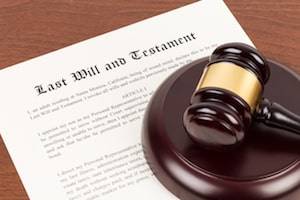Resolving Issues Involving Contested Estates in Probate Court
 An estate may be contested when an interested party (such as one of the beneficiaries) objects to using the will to distribute an estate, in whole or in part. Such objections can lead to significant delays in distributing the property to heirs, so it is important that parties to such contests be represented by qualified legal counsel who can move the process along in a timely fashion.
An estate may be contested when an interested party (such as one of the beneficiaries) objects to using the will to distribute an estate, in whole or in part. Such objections can lead to significant delays in distributing the property to heirs, so it is important that parties to such contests be represented by qualified legal counsel who can move the process along in a timely fashion.
Because the testator (the person who made the will) is dead during the probate process, proving what he or she intended at the time the will was signed can be difficult, although not impossible.
Common Challenges Made in Probate Court
Estate administration is complex, because no two wills and no two estates are alike. There are, however, common issues that are raised in probate court related to contesting a will. These include:
- Non-compliance with legal formalities. In Wisconsin, a will must be in writing, signed by the testator, and signed by two witnesses. Failure to meet all of these requirements can lead to legal issues during the probate process.
- Fraud, duress, and undue influence by a beneficiary. These challenges may come up if it is believed that the will was entered fraudulently (for example, the testator’s signature was forged), if the will was signed by the testator because of coercion, or if the testator was taken advantage of by a beneficiary who caused the testator to agree to a will to which he or she would normally not have agreed.
- The deceased lacked the mental capacity to create a will. In Wisconsin, when a person executes a will, he or she must have the mental ability to understand the nature and extent of the property and his or her relationship to the heirs. A testator is also required to have the ability to appreciate the scope and general effect of the provisions of the will in relation to the beneficiaries. A will may be challenged if a beneficiary argues that when the will was signed, the testator lacked the mental capacity to understand what they were signing.
In addition, there are other issues that may arise in probate court. For example, beneficiaries who may be missing or uncooperative can slow down the process. The law has specific notice procedures that must be followed, and failure to do so can result in a beneficiary later bringing a challenge to the will administration proceedings.
Contact a Milwaukee, WI Probate Litigation Lawyer
If you are the executor or beneficiary of an estate, you may be facing multiple issues in probate court. Probate law is highly technical and requires a skilled attorney to ensure that your interests are protected and properly heard by the court.
Our experienced Milwaukee estate and probate litigation attorneys are here to help you achieve your objectives, either through thorough estate planning or representation in legal disputes over a contested will or estate. Call our office today at 414-271-1440.
Sources:
https://docs.legis.wisconsin.gov/statutes/statutes/853
https://www.thebalance.com/how-long-will-probate-take-3505270







